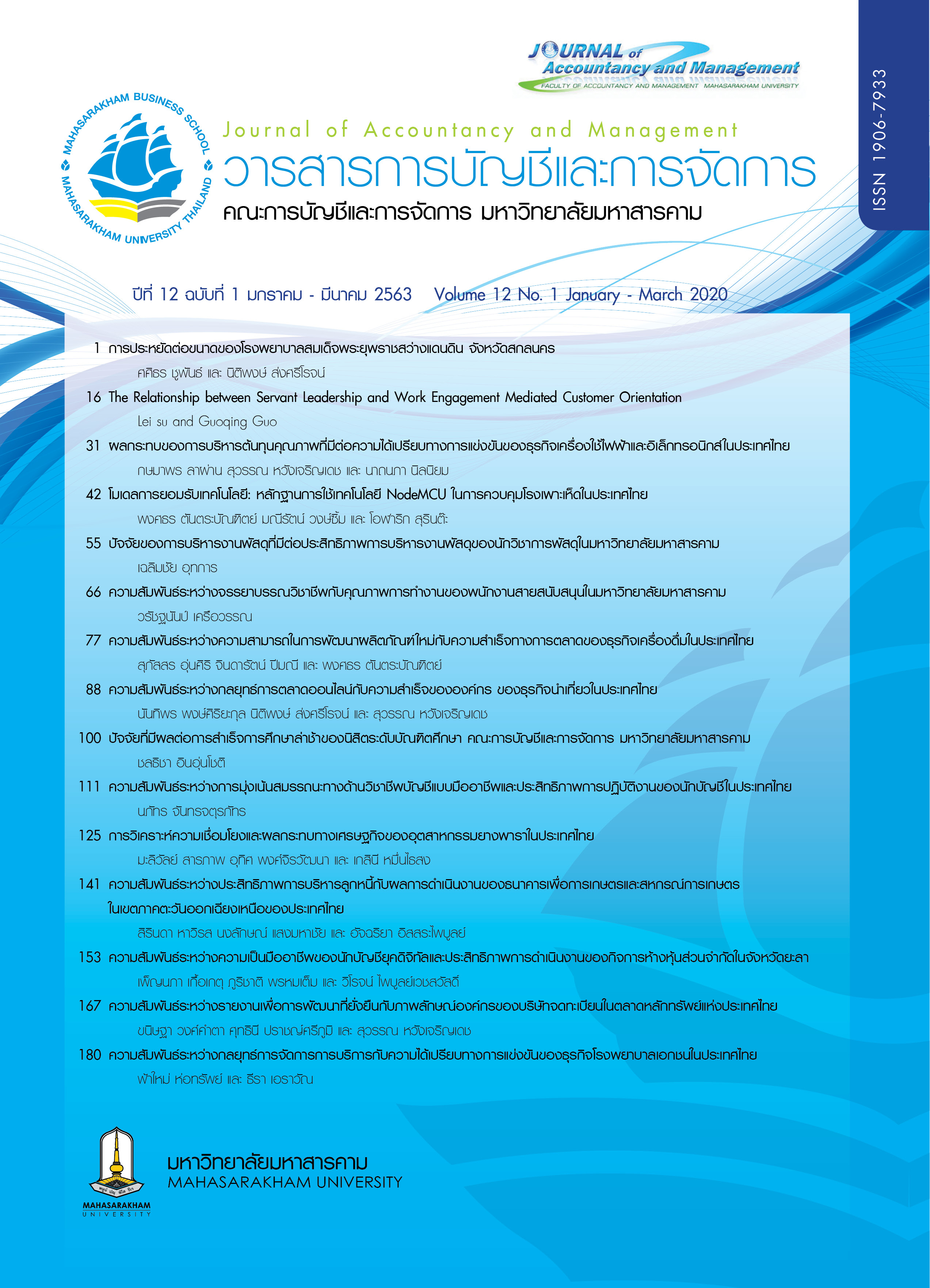ความสัมพันธ์ระหว่างความสามารถในการพัฒนาผลิตภัณฑ์ใหม่ กับความสำเร็จทางการตลาดของธุรกิจเครื่องดื่มในประเทศไทย
Main Article Content
บทคัดย่อ
การวิจัยครั้งนี้มีวัตถุประสงค์ เพื่อทดสอบความสัมพันธ์ระหว่างความสามารถในการพัฒนาผลิตภัณฑ์ใหม่กับความสำเร็จทางการตลาด ของธุรกิจเครื่องดื่มในประเทศไทย โดยใช้แบบสอบถามเป็นเครื่องมือในการเก็บรวบรวมข้อมูลจากผู้บริหารฝ่ายการตลาดธุรกิจเครื่องดื่มในประเทศไทย จำนวน 248 คน สถิติที่ใช้ในการวิเคราะห์ข้อมูล ได้แก่ (ANOVA และ MANOVA) การวิเคราะห์สหสัมพันธ์พหุคูณ และการวิเคราะห์ความถดถอยแบบพหุคูณ ผลการวิจัย พบว่า 1. ด้านนวัตกรรม 2. ด้านการวางแผนผลิตภัณฑ์ 3. ด้านกระบวนการพัฒนาผลิตภัณฑ์มีความสัมพันธ์ มีผลกระทบเชิงบวกกับความสำเร็จทางการตลาด ดังนั้น ผู้บริหารฝ่ายการตลาดของธุรกิจเครื่องดื่มในประเทศไทย ควรมีการส่งเสริมในเรื่องของการออกแบบและพัฒนาผลิตภัณฑ์ใหม่ พัฒนากลยุทธ์ด้านผลิตภัณฑ์ ด้านราคา ด้านสถานที่ และด้านการส่งเสริมการตลาด เพื่อดึงดูดความสนใจของผู้บริโภคให้เกิดความพึงพอใจมากที่สุด อันจะส่งผลต่อความสำเร็จทางการตลาดในอนาคตต่อไป
Downloads
Article Details
บทความที่ได้รับการตีพิมพ์เป็นลิขสิทธิ์ของวารสารการบัญชีและการจัดการ
ข้อความที่ปรากฏในบทความแต่ละเรื่องในวารสารวิชาการเล่มนี้เป็นความคิดเห็นส่วนตัวของผู้เขียนแต่ละท่านไม่เกี่ยวข้องกับมหาวิทยาลัยมหาสารคาม และคณาจารย์ท่านอื่นๆในมหาวิทยาลัยฯ แต่อย่างใด ความรับผิดชอบองค์ประกอบทั้งหมดของบทความแต่ละเรื่องเป็นของผู้เขียนแต่ละท่าน หากมีความผิดพลาดใดๆ ผู้เขียนแต่ละท่านจะรับผิดชอบบทความของตนเองแต่ผู้เดียว
เอกสารอ้างอิง
กรมเจรจาการค้าระหว่างประเทศ กระทรวงพาณิชย์. (2558). ความเป็นมาของธุรกิจเครื่องดื่ม. สืบค้นเมื่อ 23 มิถุนายน 2561. จาก https://www.dtn.go.th/index.php/policy-brief/6.html.
กรมโรงงานอุตสาหกรรม. (2561). ฐานข้อมูลผู้ประกอบการธุรกิจเครื่องดื่มในประเทศไทย. สืบค้นเมื่อ 23 มิถุนายน 2560. จากhttps://www.diw.go.th/hawk/content.php?mode=data1search.
ฉลองศรี พิมลสมพงศ์. (2556). การจัดบริการอาหารและเครื่องดื่ม. มหาวิทยาลัยเกษตรศาสตร์ :กรุงเทพมหานคร.
ฉัตยาพร เสมอใจ และฐิตินันท์ วารีวนิช. (2556). หลักการตลาด = Principle of Marketing. ซีเอ็ดยูเคชั่น : กรุงเทพมหานคร.
ชีวรรณ เจริญสุข. (2556). บทที่ 1 แนวคิดทฤษฎีทางการตลาด (MARKETING THEORY). สืบค้นเมื่อ15 มิถุนายน 2560. จาก https://maymayny.wordpress.com/2014/12/07/.
ชูศักดิ์ เดชเกรียงไกรกุล. (2558). การวางแผนธุรกิจ. ซีเอ็ดยูเคชั่น : กรุงเทพมหานคร.
ฐิตินันท์ วารีวนิช. (2548). หลักการตลาด. ซีเอ็ดยูเคชั่น : กรุงเทพมหนคร.
นันทัช จิระวุฒินันท์. (2559). ความสัมพันธ์ระหว่างอัตลักษณ์ตราสินค้ากับผลการดำเนินงานทางการตลาดของธุรกิจเครื่องดื่มในประเทศไทย. วิทยานิพนธ์ปริญญาบริหารธุรกิจมหาบัณฑิต, สาขาวิชาการจัดการการตลาด คณะการบัญชีและการจัดการ มหาวิทยาลัยมหาสารคาม.
บุษบา หรัญรัตน์. (2559). ผลกระทบของศักยภาพในการพัฒนาผลิตภัณฑ์ใหม่ที่มีต่อความสำเร็จในการดำเนินงานของธุรกิจเครื่องสำอางในประเทศไทย. วิทยานิพนธ์ปริญญาบริหารธุรกิจมหาบัณฑิต สาขาวิชาการจัดการการตลาด คณะการบัญชีและการจัดการ มหาวิทยาลัยมหาสารคาม.
ศิริวรรณ เสรีรัตน์. (2545). การจัดการองค์กรและการจัดการ. ธรรมสาร : กรุงเทพมหานคร.
รัตชพงษ์ เขียวพันธ์. (2557). ลักษณะเฉพาะตัวของแบรนด์ (Brand Characteristics) เพื่อสร้างแบรนด์ (Brand) อย่างยั่งยืน = Creating Unique Brand Characteristics for Sustainable Brand Building. สืบค้นเมื่อ 28 พฤษภาคม 2560. จากhttps://opac.lib.buu.ac.th/servlet.
สุวิมล ติรกานันท์. (2551). การสร้างเครื่องมือวัดตัวแปรในการวิจัยทางสังคมศาสตร์ : แนวทางสู่การปฏิบัติ. กรุงเทพมหานคร : จุฬาลงกรณ์มหาวิทยาลัย.
สืบชาติ อันทะไชย. (2556). การบริหารการตลาด = Marketing Management. โอเดียนสโตร์ :กรุงเทพมหานคร.
สำนักงานคณะกรรมการการส่งเสริมการลงทุน. (2558). การส่งเสริมการลงทุนธุรกิจเครื่องดื่ม. สืบค้นเมื่อ 1 กรกฎาคม 2560. จาก https://www.boi.go.th/index.php?page=index&language=th.
Aaker, J. L., Benet-Martfnez, V. and Garolera, J. (2001). Consumption symbols as carriers of culture: A study of Japanese and Spanish brand personality constructs. Journal of Personality and Social Psychology, 81(3), 492-508.
Black, W. C. (2006). Multivariate Data Analysis. 5thed. Upper Saddle River, NJ: Prentice-Hall.
Nunnally, J. C. (1978). Psychometric theory. New York : McGraw-Hill.
Perreault, W. D. and McCarthy, E. J. (1991). Basic Marketing. New York : Mcgraw-Hill College.


